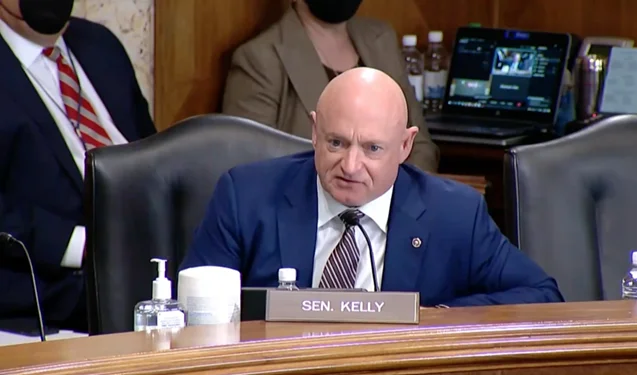WATCH: Sen. Kelly Advocates for Boat Ramp, Road Improvements in Northern Arizona
Arizona Senator Mark Kelly is calling on the Interior Department and the U.S. Forest Service to extend stranded boat ramps at Lake Powell and to repair Snowbowl Road near Flagstaff, which hasn’t seen major upgrades in more than 30 years.
During a Senate hearing on critical maintenance needs in national parks and forests, two administration witnesses testifying before the Senate Subcommittee on National Parks, Shannon Estenoz, Deputy Assistant Secretary for Fish and Wildlife and Parks, and Chris French, Deputy Chief of the Forest Service, committed to funding Lake Powell and Snowbowl Road improvements under the Great American Outdoors Act, the Bipartisan Infrastructure Law, and the recently enacted appropriations for disaster relief.

Ms. Estenoz said that Glen Canyon National Recreation Area would receive $31 million to address boat ramp and related infrastructure that have been crippled by rapidly reducing water levels in Lake Powell to due historic drought.
Drought conditions in the West have reduced water elevations inside Glen Canyon National Recreation Area to 34 percent capacity, which has curtailed the launching of motorized boats at Wahweap Marina near the City of Page. Last summer, Kelly sent a letter to the U.S. Army Corps of Engineers requesting permission to extend boat ramps to accommodate increases in summer boating activity. Yesterday’s hearing follows continued requests from Kelly to the National Park Service to address the need to expand the boat ramps to accommodate Lake Powell visitation.
You can watch the full exchange HERE. A transcript is below.
Kelly: Thank you Mr. Chairman, thank you for holding this hearing. And thank you everyone for being here today. Ms. Estenoz, my first question is for you.
I’d like to discuss the declining water levels in Lake Powell in the Glen Canyon National Recreation Area. In October, I spoke to Director Sams about this, and I know he is taking a look at this and tracking it closely.
Lake Powell is one of the most popular boating locations in the West. It receives somewhere around 3 million annual visitors.
Drought has reduced the levels in Lake Powell by 22 feet over the last six months. We are down to one boat ramp. This is an 180-mile long reservoir. One boat ramp.
This is crushing the tourism economy and industry in northern Arizona.
The other 10 boat ramps at Lake Powell are currently, essentially beached, and many were on standby or ready to be replaced because they were just old.
Can we look into using Great American Outdoor Act funding to replace and extended those boat ramps?
Estenoz: Thank you, Senator Kelly for raising a really profound issue of this second and third order effects of the prolonged drought that we’re experiencing. Lake Powell, you’re right, has dropped 22 feet and projections are it may continue to drop. The park is going to be receiving about $31 million dollars in supplemental disaster funding to address, I’m pleased to report, to address some of these boat ramp and attendant utility issues as well. It’s not just extending a boat ramp but also extending perhaps water wells and the like that go with the boat ramp. In terms of eligibility for deferred maintenance, that evaluation will be done to the extent that these project qualify for deferred maintenance, the $31 million dollars is going to give us a really good start on alleviating the pressure there and you know for a situation that we know is creating significant economic hardship.
Kelly: What is the timeline for…with this money to get the extensions done for these boat ramps?
Estenoz: Senator, can I get back to you with that with the answer to that question?
Kelly: Yes, appreciate that. Thank you. Mr. French, it’s good to see you again.
I want to discuss Forest Service Road 516 on the Coconino National Forest. Many Arizonans call this the Snowbowl Road.
It’s the main access road used by visitors to the San Francisco Peaks, one of the most visited and cherished mountains in Arizona. At 12,000 feet, it is the tallest mountain in our state. An estimated 500,000 people visit the Peaks every year. Unfortunately, the six-mile road is in disrepair and needs to be, it needs some significant upgrades. The last time it was re-paved was in 1990. It’s been awhile. Only minor improvements have been made over the past 30 years.
So, Mr. French, does the Forest Service plan to allocate resources improving Snowbowl Road, is that part of the plan for the funding under the Great American Outdoors Act?
French: Yeah, thank you Senator for the question. I know this road well. Total costs for that road are somewhere between $9 million and $13 million dollars to do the full repairs. It did not meet the first year’s Great American Outdoors Act work where the average project was about a million dollars. But given the broader streams of funding we have right now for roads, we are confident that we should be able to put together a package that will address that road here and pretty shortly.
Kelly: When you say broader streams of funding you mean additional funding from the bipartisan infrastructure bill?
French: Yeah, and there’s multiple beyond that I mean, specifically like the federal highways funds, that’s correct.
Kelly: Was consideration given for the Federal Lands Transportation Program in the BIF [bipartisan infrastructure law]?
French: Yes, and I think, you know, we’re still looking at exactly what those percentages will be that working with the Department of Transportation ofwhat portion of that we’ll get but we are prioritizing, you know, a number of those large, paved roads that are very expensive under that program.
Kelly: As the plan comes together for the repair of this road, if you could please just keep my office informed.
